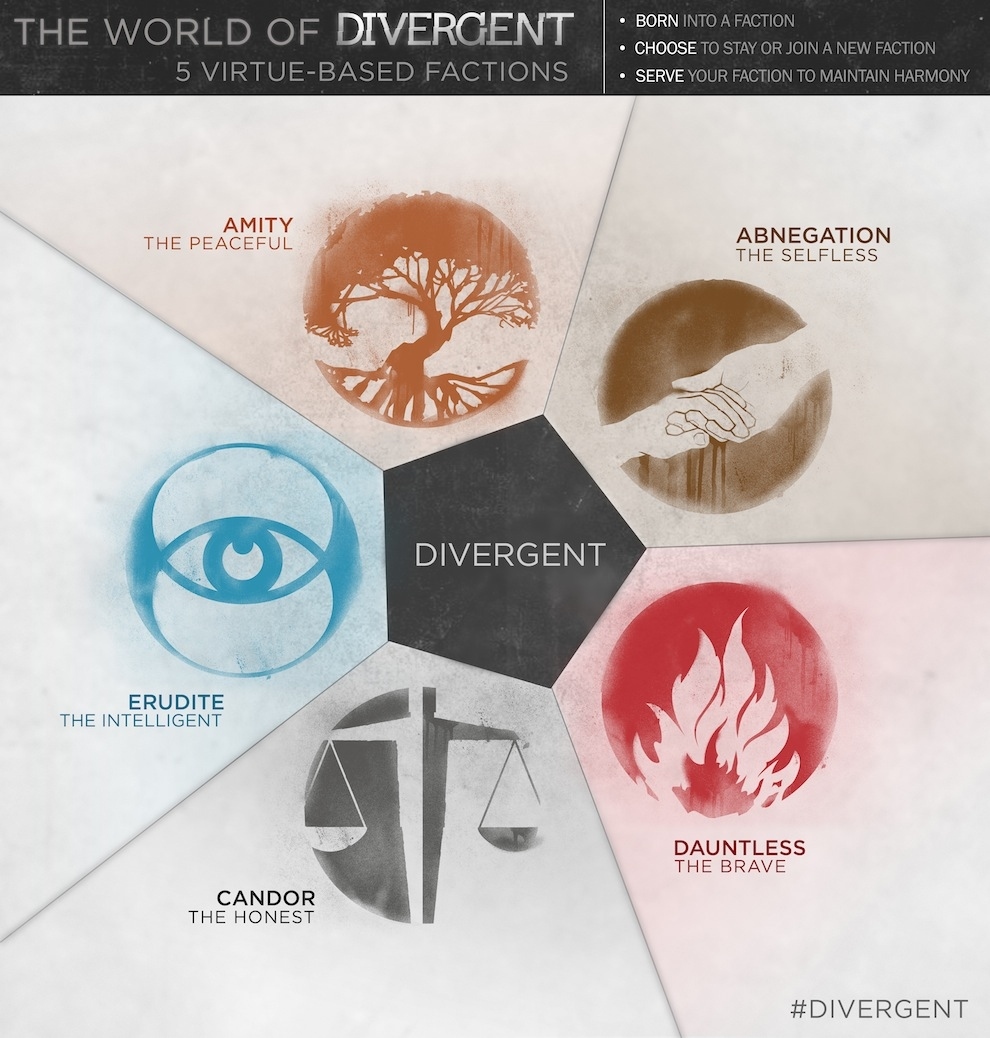Divergent factions inhabit a world where choices define identity and societal roles. These factions represent unique ideologies, values, and lifestyles that shape the lives of their members. In a society where conformity is prized, the existence of divergent factions offers a lens through which we can explore individuality, choice, and the consequences of defiance against the norm. As we delve deeper into the complexities of these factions, we will uncover the intricate tapestry of human experience that shapes their existence.
In a world defined by its rigid structures, the divergent factions emerge as a beacon of rebellion and self-determination. Each faction symbolizes a distinct perspective, encouraging its members to embrace their strengths while challenging the status quo. The interactions between these factions create a dynamic narrative that speaks to the heart of human nature, illuminating the struggle between conformity and individuality. As we examine these factions, we will gain insight into the motivations that drive their members and the societal implications of their choices.
Understanding the concept of divergent factions is essential to grasping the broader themes of conflict and resolution that define many narratives. The interplay between these factions reflects the complexities of human relationships, power dynamics, and the quest for identity. By analyzing the characteristics and philosophies of each faction, we can better comprehend the challenges and triumphs faced by those who dare to diverge from the expected path.
What Are the Main Divergent Factions?
The world of divergent factions is often represented by five main groups, each embodying specific traits and beliefs. These factions are:
- Abnegation: The selfless faction prioritizing the needs of others over their own.
- Amity: The peaceful faction that values harmony and friendship above all else.
- Candor: The honest faction that believes in truthfulness and transparency.
- Dauntless: The brave faction that embraces fearlessness and courage.
- Erudite: The intelligent faction that seeks knowledge and wisdom at all costs.
How Do Divergent Factions Impact Society?
The presence of divergent factions significantly affects the social structure and dynamics of their environment. Each faction contributes to a diverse society, promoting a range of ideas and perspectives. However, this diversity can also lead to conflict, as differing beliefs and values clash. The interplay of these factions can result in:
- Social tension and rivalry between factions.
- Opportunities for collaboration and understanding.
- Challenges in governance and leadership.
- Personal growth as individuals explore their identities.
What Are the Consequences of Diverging from One’s Faction?
Choosing to diverge from one’s assigned faction can have profound implications. Individuals who reject their faction’s norms may experience:
- Isolation from their peers and family.
- Heightened scrutiny and judgment from others.
- The burden of navigating a complex identity.
- Empowerment through self-discovery and autonomy.
Can Individuals Belong to Multiple Divergent Factions?
The concept of belonging to multiple divergent factions is a contentious topic within the narrative. While some characters exhibit traits from various factions, the society often views this as a threat to the established order. This notion raises questions about personal identity and the validity of hybrid identities. The idea of being “divergent” suggests that individuals can embody characteristics from multiple factions, leading to the potential for:
- Innovative perspectives and solutions.
- Increased conflict with traditionalists.
- A broader understanding of the world and oneself.
- Possibility of creating new factions altogether.
What Role Do Leaders Play in Divergent Factions?
Leadership is a critical component within each faction. Leaders often embody the faction's core values, acting as role models and decision-makers. The effectiveness of a leader can influence the faction's cohesion and success. Key roles of leaders include:
- Setting the vision and direction for the faction.
- Resolving conflicts and maintaining harmony.
- Inspiring members to uphold the faction's values.
- Facilitating alliances or rivalries with other factions.
How Do Divergent Factions Reflect Real-World Issues?
The themes surrounding divergent factions resonate with many real-world issues, such as:
- Societal division and polarization.
- The struggle for acceptance and identity in diverse communities.
- Challenges in leadership and governance.
- The quest for individuality in a conformist society.
What Can We Learn from Divergent Factions?
Diving into the world of divergent factions offers valuable lessons about the nature of identity, choice, and the importance of understanding diverse perspectives. By exploring these factions, we can appreciate the complexities of human relationships and the power of individuality. Key takeaways include:
- Embracing diversity fosters understanding and growth.
- Conformity can stifle creativity and innovation.
- Leadership requires empathy and adaptability.
- Personal choices shape our identities and relationships.
Conclusion: The Legacy of Divergent Factions
The exploration of divergent factions reveals a rich tapestry of human experience, reflecting the ongoing struggle between conformity and individuality. By understanding these factions and their implications, we can glean insights that extend beyond fiction and into our everyday lives. The legacy of divergent factions serves as a reminder of the power of choice, the importance of understanding diverse perspectives, and the beauty of embracing our true selves.
You Might Also Like
Unraveling The Mystery: What Happened To FGTeeV Shawn?Unveiling The Symbolism Of Hawks: What Do Hawks Symbolize?
Diddy’s Net Worth 2024: An In-Depth Look At The Hip-Hop Mogul
Unveiling The Mysteries Of The Zodiac Sign June 4
Discovering The Hidden Life Of Vin Diesel's Twin Brother
Article Recommendations
- Catherine Bell Partner
- Katherine Harbaugh
- Jameliz S
- Jessica Alba Diddy
- Mary Austin
- Tom Hughes Partner
- Bobbye Brooks Oliver
- Michael Galeotti
- Kyle Singler Wife
- Gloria Borger Illness


